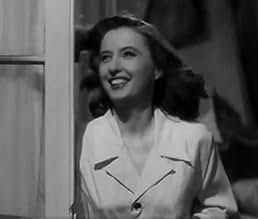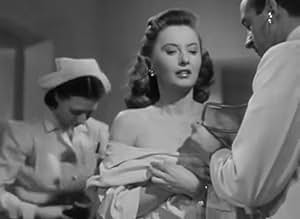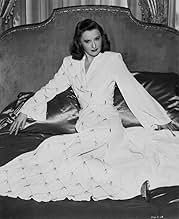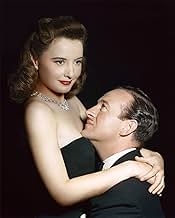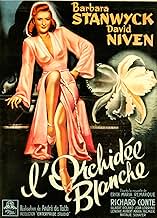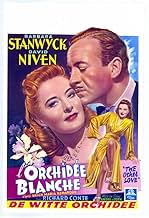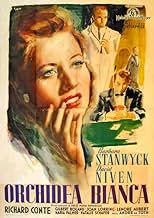Karen Duncan, a seriously ill concert pianist, enters a Swiss sanatorium where she's attracted to Dr. Tony Stanton. Ignoring his warnings about resting, she leaves for Monte Carlo with Paul ... Read allKaren Duncan, a seriously ill concert pianist, enters a Swiss sanatorium where she's attracted to Dr. Tony Stanton. Ignoring his warnings about resting, she leaves for Monte Carlo with Paul Clermont despite possibly fatal consequences.Karen Duncan, a seriously ill concert pianist, enters a Swiss sanatorium where she's attracted to Dr. Tony Stanton. Ignoring his warnings about resting, she leaves for Monte Carlo with Paul Clermont despite possibly fatal consequences.
- Restaurant Patron
- (uncredited)
- Casino Patron
- (uncredited)
- Casino Patron
- (uncredited)
- Roulette Player
- (uncredited)
- Casino Patron
- (uncredited)
- The Florist
- (uncredited)
- Townsman
- (uncredited)
- Party Guest
- (uncredited)
- Director
- Writers
- All cast & crew
- Production, box office & more at IMDbPro
Storyline
Did you know
- TriviaAlthough it is never stated in the film, Karen Duncan is suffering from tuberculosis (TB). One of the earlier treatments for TB was to place the patient in a healthy environment with continuous fresh air (often in a mountain or desert location), and to ensure that he/ she had a good diet and plenty of rest. This resulted in the establishment of many sanatoriums for TB patients (similar to the one run by Stanton) all over the world, .
- GoofsWhen Stanton gives Karen an X-ray, neither he nor the nurse stand behind any radiation protection. However, in the 1940s, X-rays were not yet considered dangerous, and this technology was widely used. Shoe stores even used X-rays to measure customers' feet through the 1950s.
- Quotes
Paul Clermont: Whither thou goest, so shall I!
Karen Duncan: That would be hard for both of us.
- Crazy creditsOpening credits prologue: SWITZERLAND
- Alternate versionsThere is an Italian edition of this film on DVD, distributed by DNA srl, "STELLA DALLAS (Amore sublime, 1937) + ORCHIDEA BIANCA (1947)" (2 Films on a single DVD), re-edited with the contribution of film historian Riccardo Cusin. This version is also available for streaming on some platforms.
- ConnectionsReferenced in Lolita (1997)
- SoundtracksÉtude No. 3, Un sospiro
Music by Franz Liszt
A torrid but never horrid romantic movie, what was called then a "woman's picture" and is now in the category of "chick flic." Which is what makes it worth watching right there--it's dripping with love and longing and ideals gone astray. It's set in a sanitarium the Swiss Alps and is grand as well as comforting. And it stars Barbara Stanwyck as a world famous pianist, and she pulls every scene up a notch. The men are less compelling: David Niven is necessarily dry and reserved (and no great contribution to the romance), and Richard Conte is supposed to be the Italian love idol but in fact he's dry and reserved, too, unnecessarily.
The plot is based on a short story by the uneven but legendary German writer Erich Maria Remarque (who is neither a woman nor French), whose work is the basis of several movies, notably the pacifist WWI novel, "All Quiet on the Western Front." I say all this because the one clear flaw in this movie is the plot, the Remarque part of it. In a way, the idea of going to a t.b. clinic to get better or die (the two options equally likely back then) and having an arrogant famous woman face her mortality, sounds like a no-brainer. And her back and forth, her rebellion, her falling in love (tepidly) or falling in lust (still rather tepidly) is great stuff not quite exploited. And there is no real turn of events. It plays itself out, beautifully but inexorably.
That is, this is a really warm, gorgeous movie, with photography by Victor Milner, who had just finished two cinematic masterpieces ("It's a Wonderful Life" and Stanwyck's previous film, "The Strange Love of Martha Ivers"). And the music is great (of course), led by Miklos Rozsa, an old world high romantic composer. You want to be there, and you relate to Stanwyck's dilemma. It's a great movie in its bones, but never quite getting off the ground. Yet it is about stuff that matters: acceptance and deception in the face of death, from several sides. And it is, in fact, about true love of some highly idealized, self-sacrificing kind.
- secondtake
- Mar 25, 2011
- Permalink
- How long is The Other Love?Powered by Alexa
Details
- Release date
- Country of origin
- Languages
- Also known as
- Erich Maria Remarque's The Other Love
- Production company
- See more company credits at IMDbPro
- Runtime1 hour 35 minutes
- Color
- Aspect ratio
- 1.37 : 1
Contribute to this page


